#Literary Discourse
Explore tagged Tumblr posts
Text
This post is inspired by one I saw about the "why are the curtains blue" discourse of literary analysis
Please bear with me because I cannot find it again and I did not read more than a few words before I accidentally clicked away and lost it to the void of my dash
So I really don't know if I'm just remaking their point since I'm not sure what their point is
But it did get me thinking
The two sides of the discourse seen to be:
1. The curtains are blue just because the author said they are blue. There is no need meaning (ie: things in a background of a story are just there there is no hidden depth)
And
2. The curtain are blue because the author intended represent the sadness and depression character A feels during this moment in a story (ie: everything in a fictional story has weight and meaning behind it and it's important to understand the authors intent)
And that's the problem with the "why are the curtains blue" discourse. It's way too focused on author's intention
When I was in school if the teacher was asking about the curtains for example it always "what did the author intend the curtains to represent?" Or "what did the author mean by adding this"
And I always struggled with that because
1: I don't have the author in front of me to ask and how am I supposed to know what was going through their head at the time
2: I know for a fact that when I write creatively sometimes my intention with a scene is that there curtains are just blue but other people read something deep into it
So it feels like the question is unnecessary bullshit
And that's because it's the wrong question to ask
If you asked me something like "How did the colour of the curtains contribute to the atmosphere of the scene" than I'm more likely to be able to give you an answer!
Because that's really what literature analysis is doing. It's less authors intention (though that is still a part of it) but also how do all the pieces of the story help shape it regardless of author intent.
And going back to my own writing when someone says something like "I really like how x detail shows that character A is really feeling my in this scene despite his brave front" and I don't even remember that detail nor intended for that to be the case?
I don't think "the curtains are just blue stupid" I think "wow. I'm a secret genius because that does totally do that!"
Like authors can write in those kind of details and not realise until a reader points it out. They can also convey a message that they didn't intend. Like Ray Bradbury has argued that Fahrenheit 451 was not about censorship at all but a lot of readers felt it was
And to a certain extent neither is wrong. Bradbury may not have intended that message but it's still what readers heard.
The question isn't "what is the true secret reason why the curtains were blue?"
The question "how did the curtains being blue influence your feelings while reading the scene?"
126 notes
·
View notes
Text
Time loops are really about trauma. Ghosts are really about trauma. Vampires, of course, were about trauma the entire time. Frankenstein is about trauma. So is Wuthering Heights. So is Jane Eyre. And of course Sense and Sensibility is about trauma as well. You know what else is just a neat package for trauma ? Fairy tales. Sitcoms. Poetry. Gilgamesh was of course about trauma, as were the Iliad and the Odyssey. Gawain and the green knight, Dante's Inferno, Don Quixote number among the moving testaments to trauma. History is just the record of trauma, Geography is also the record of trauma, and Political Philosophy as well. The above are also causes for trauma. Trauma itself is, as anyone who has experienced trauma can tell you, a source of trauma. Trauma from the greek Trauma, meaning wound. The absence of the word wound in favour of the word trauma is an exemple of trauma in language. Trauma is the body of Christ, of every woman, of every child, of every old person, of every outcast, everyone whose body can be freely subjected to violence, of everybody who shirks and shies away from violence. Of everyone who visits violence upon another. Trauma endures, and if trauma is ever forgotten, that too is trauma. Trauma means wound and we all know what wounds mean. Jenny Holzer said it best. Hiding trauma is a form of trauma, as is displaying it proudly on one's chest. Ignoring it, never acknowledging its presence is also trauma. Dreams replay and reword and foretell trauma. Trauma will affect the way you will treat your children, your parents, your friends and lovers, and every stranger. Especially the strangers. It's not like you're the master of your trauma. It's not like your trauma masters you either. It's on you, it makes you, but it's not of you. We all have experienced trauma because society is a trauma-inflicting machine. We will never be free of trauma. We desperately want to be free of it. Some of it we can free ourselves from, if we learn the ways and and work hard and try to understand it. We know of people it has worked on. We want that from ourselves and are glad for them. One day. One day. One day.
..... Anyhow I can't believe some people still believe in Freud. Dude high off his mind on cocaine saying whatever, right ?
#sigmund freud#freud#trauma#literary discourse#my point isn't that the people saying the above about trauma are wrong#because yeah yeah sure the trauma plot kids are ruining literature back in my day yada yada#i'm more interested in the fact that this is a coherent system of thought that's like 80% what Freud said#yet no one takes Freud seriously amongst the people saying the above#I'm not saying that's an indefensible position: i took care to not exaggerate or strawman any of the above points#you could build a fort on that hill and die having vanquished more foes than you could count#yet somehow... it feels wrong to me. i don't have an alternative but this is a lens I cannot put my whole heart behind#I want to point at it and then i'd like to see someone pointing at something else#no more no less
10 notes
·
View notes
Text
genuinely like. so often ill be reading fanfiction and im struck by the frustration that people, SCHOLARS, dont believe in the literary merit of it. its just heartbreaking because some of the best stories ive read are fanfiction and i wish that i could talk about them the same way i talk about books but they arent accepted!! its like. most of these, if you didnt know, you wouldnt even think they were fanfiction. because hey wow, just like every other type of literature and media, fanfiction isnt a monolith and yeah some of them are probably cringy and stupid, but theres also just like.. these incredible stories and displays of literary talent!!! i know times are changing and fanfiction is getting talked about in college classes and stuff, hell ive been in those classes, but most of time, theres still such a huge stigma around fanfiction. it just makes me sad.
if you read this, would you think it was a fanfiction?

2 notes
·
View notes
Text
one of my students transformed my thinking on the "reliable narrators" fixture in literature which is that NONE of us are reliable-- and also all of us are. Perspective is truth, but perspective is not accuracy. I don't use this model anymore because often it's kind of like "oh this narrator's a liar, this narrator's depressed, this narrator's committing crimes, etc etc." We have to trust anyone who's telling their story, that's human and artistic connection! Literature is not a legal record, it's witness!
not a single reliable narrator in sight
#literature#thoughts#reliable narrators#reliable narrator#fiction#literary discourse#literary criticism
25K notes
·
View notes
Text
Literary Dichotomy: Celebrated Authors and their Controversial Works Unveiled
Literary Dichotomy: Celebrated Authors and Controversial Works Unveiled #LiteraryCritique #BookDebate #ReadersPerspective #AuthorsJourney #ControversialLiterature #BookReviewers #DiverseNarratives #LiteraryOdyssey #CelebratedWriters #BookLovers
Navigating Controversy in Literature: Exploring the Impact of Challenging Narratives In the realm of literature, the power to evoke strong emotions and stimulate profound discussions often lies in works that traverse the boundaries of societal norms. While celebrated for their capacity to shed light on complex issues, novels have the potential to generate controversy that ignites debates about…
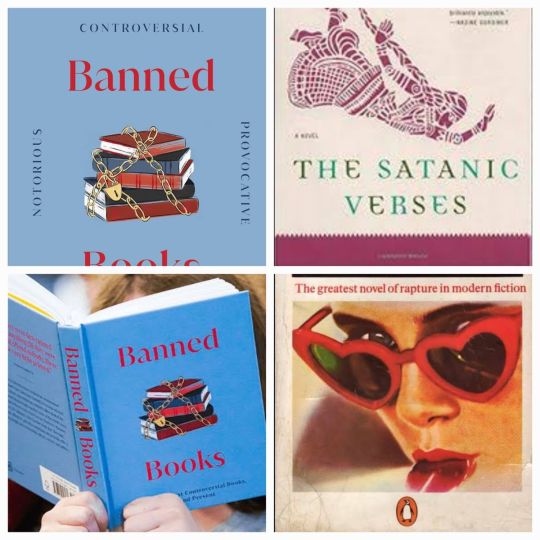
View On WordPress
#Admiration and criticism#Author Backlash#Controversial literary works#Controversial Novels#Critique in literature#Hated Books#Impact of controversial books#Literary Criticism#Literary Discourse#Mixed Reviews#Nuances in literature#Philosophical novels#Polarized perspectives#Renowned authors#Unexpected sequels
0 notes
Text
Yes, not all fiction has to be about relatable and morally good protagonists. It is perfectly okay to have your protagonist be a deeply and fundamentally flawed person, it's your work, you get to explore whatever character archetypes you want in in.
Yes, some people will avoid interacting with stories if they don't vibe with the protagonists and find them too unlikeable for their enjoyment. It is perfectly okay to not read or watch something if it makes you feel bad, even if it's something that is universally praised and considered a classic, and it's okay that some people will avoid your work because it's not their cup of tea. It doesn't mean that your work is bad, and it doesn't mean that it won't find an audience elsewhere.
Yes, some people will disagree with you on whether a flawed and morally complex character has been executed well by the author, whether their writing is good and whether they are adequate at serving their purpose in the narrative. Art is subjective and is bound to generate discussion, and art critique is often coloured by the critic's personal impressions and life experiences. Whether or not somebody is enjoyable as a character often depends entirely on the reader's personal interpretation of them, and takes on the same character may vary drastically among a given work's fanbase.
Yes, there is hate out there for your favourite character ever whom you very much relate to, and it sucks. No, the people who hate them do not hate you, personally, and their reasons for such an intense reaction might be tied to their own interpretation that is drastically different from yours. This does not mean that you shouldn't create art and show your love for this character, your feelings are just as valid and important as theirs.
Yes, there are fans of a character that you hate with a passion because their image is tied to some horrible real-life events for you. No, these people do not hate you either, and are not condoning whatever horrible thing that has happened to you. Their love for this character comes from a place of a very different interpretation and life experience, and that's okay. This doesn't mean that you have to force yourself to interact with media involving said character, especially if it makes you feel bad.
Anyway, the ways in which people interact with fiction are varied and complex, and I wish we were all a little bit more chill about it. Art brings us intense emotions, both creating and appreciating it - it's kind of why we make art in the first place. Art is the antithesis of war, and we should be more kind to both artists and ourselves.
#you will never believe what fandom made me think about all this#art#fiction#literature#essay#literary analysis#meta#media analysis#media discourse#literary discourse
0 notes
Text

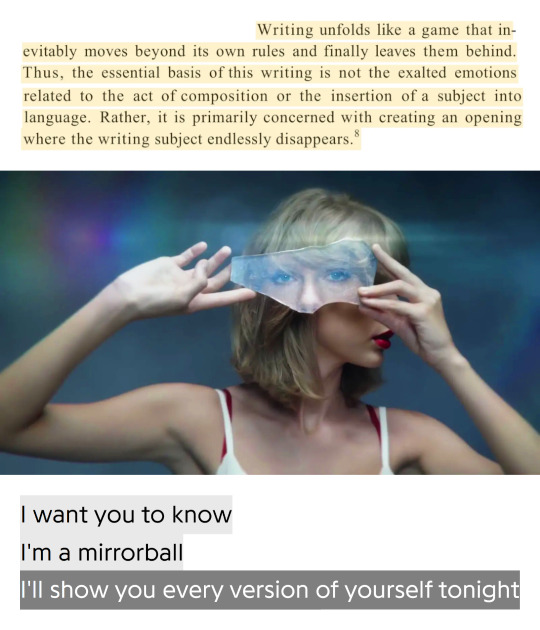
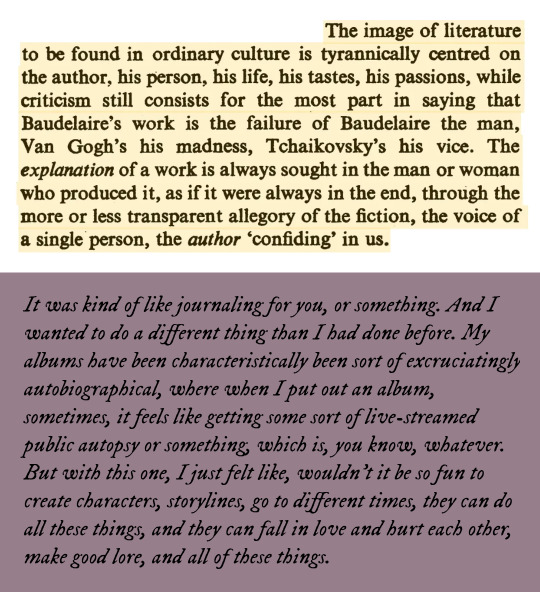




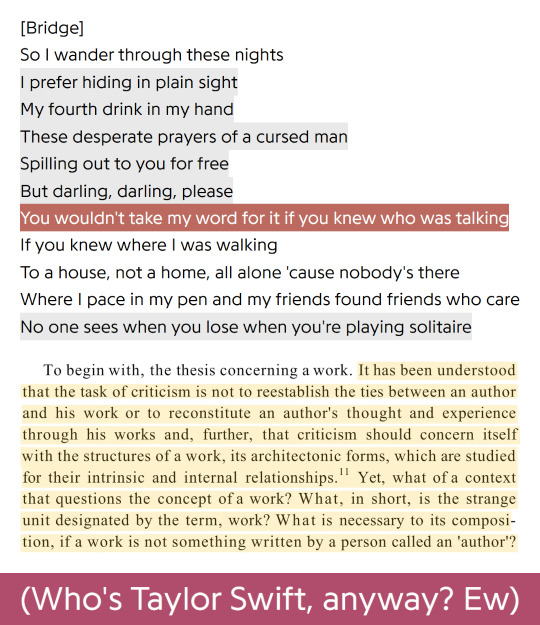

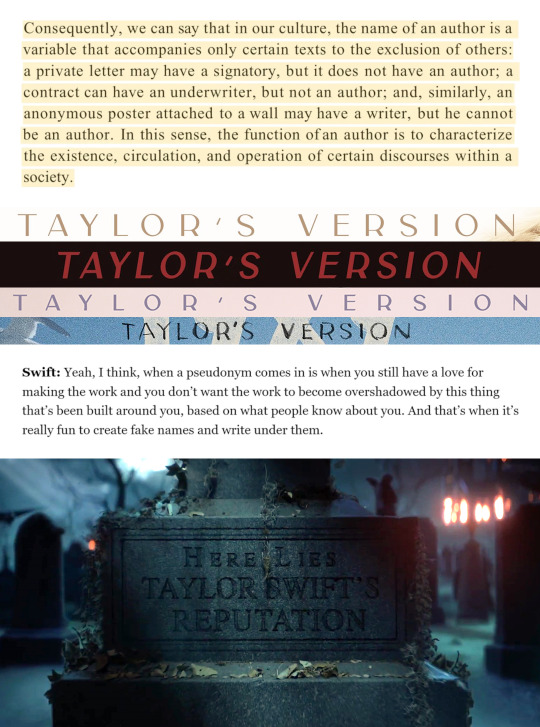
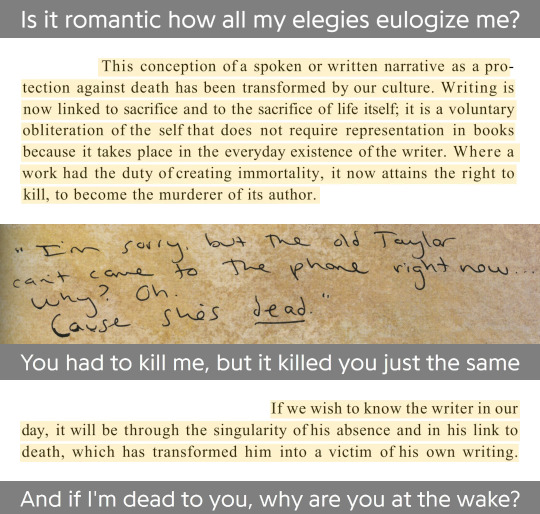
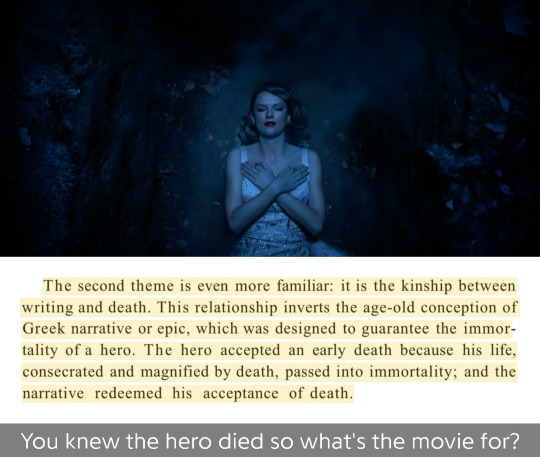

Death of the Tortured Poet
Taylor Swift and other poets in conversation with Roland Barthes's "The Death of the Author" (1967) and Michel Foucault's "What is an Author?" (1969)
I want to say thank you to @ttpds @youmeetyourself and @ohdorothea. This post would not exist were it not for your musings on the topic, our conversations, and your encouragement. Seriously, thank y'all.
Sources:
Unless otherwise noted, lyrics are from Genius and screenshots/scans/etc are from taylorpictures.net
Barthes, Roland. "The Death of the Author"
"delicate" music video
"Dear Reader" lyrics
Foucault, Michel. "What is an Author?"
"Style" music video
"mirrorball" lyrics
Barthes
Taylor Swift before singing "betty" on the Eras Tour in Glendale, AZ on March 17, 2023 (text from @cages-boxes-hunters-foxes)
Siken, Richard. "The Torn-up Road" in The Iowa Review
Promotional image for The Tortured Poets Department from Swift's social media
Savage, Mark "Midnights: What we know about Taylor Swift's songwriting" for BBC.com
Foucault
reputation prologue
Barthes
Promotional image for The Tortured Poets Department
Barthes
Halsey. "Gasoline" lyrics
"mirrorball" lyrics
Barthes
Florence & the Machine. "King" lyrics
"Dear Reader" lyrics
Foucault
"22" lyrics
Foucault
"Out of the Woods" music video
"...ready for it?" music video
"Anti-Hero" music video
"look what you made me do" music video
"if you're anything like me" from the reputation magazines
Foucault
Album covers for the Taylor's Versions of Fearless, Red, Speak Now, and 1989
Taylor Swift in Musicians on Musicians: Taylor Swift & Paul McCartney for Rolling Stone
"look what you made me do" music video
"the lakes" lyrics
Foucault
"look what you made me do" handwritten lyrics from the reputation magazines
"my tears ricochet" lyrics
Foucault
"my tears ricochet" lyrics
"look what you made me do" music video
Foucault
"hoax" lyrics
"why she disappeared" from the reputation magazines
Barthes
1989 prologue
Foucault
#alternate title: what if you got so invested in fandom discourse that you read literary theory and got really weird about it#alternate alternate title: oh michel we're really in it now#taylor swift#the tortured poets department#sydposting
805 notes
·
View notes
Text
there is absolutely nothing a nightly doom scroll on jstor won’t solve
389 notes
·
View notes
Text
noooo don’t advocate to get rid of one of the main character’s two best friends who narratively and symbolically has always represented home safety and stability in contrast to the one associated with change and risk that ultimately form a nice narrative balance between the things that change and the things that don’t because both are important in life when growing up she’s so cute ahahaha
#kairi discourse is why people need to develop some literary analysis skills tbh#also#don’t you understand that destiny islands themselves are symbolic dude!!!#kingdom hearts
210 notes
·
View notes
Text
Not sure what my motive is here, but . . .
The results will not affect which books I post about, because I actually have to want to read them, but I'm dying to know who likes to suffer!
#please i really wanna see the discourse!#book recommendations#queer books#polls#queer#literary tropes#literary fiction#fantasy books#romance books#science fiction books#historical fiction#books#queer community
216 notes
·
View notes
Text
WC Fandom Callout/Hot Take Time!
(I would like to preface this by saying that I am a member of the Warrior Cats community myself; I love it here and there are so many amazing and talented people. This post is by no means saying that everybody here is guilty of this, nor is it meant to be an attack or show of ill will on those who are. <:])
Okay, so I have a small grievance to air:
Never, in all my years on the internet, have I ever seen a community that matches the sheer amount of negativity and petty spite the WC fandom has, especially towards its own creators.
Exhibit A:
WC fandom:
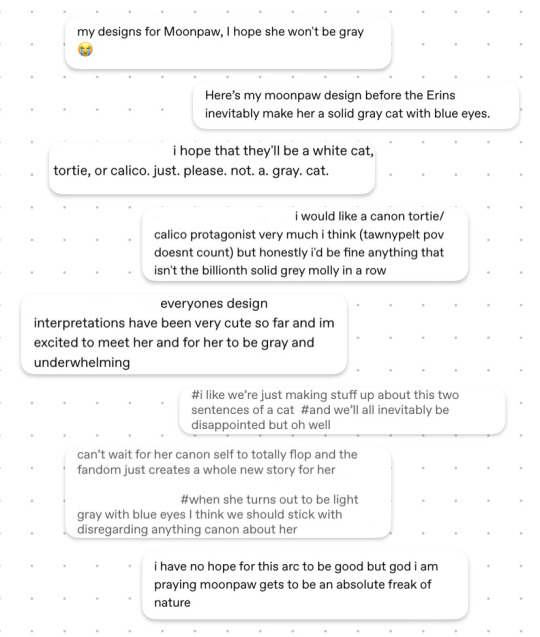
The Erins: *actually give us the most pretty, fun, and unique canon design we’ve ever gotten, which CLEARLY IS A CHIMERA AS THEY INTENDED DUE TO HOW HER BLACK FUR IS LONGER THAN HER ORANGE FUR (LOOK AT HER CHEEK FLUFF)*
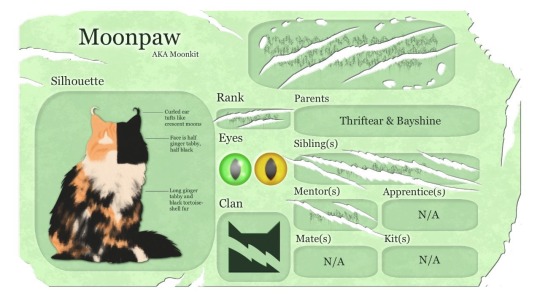
WC Fandom:
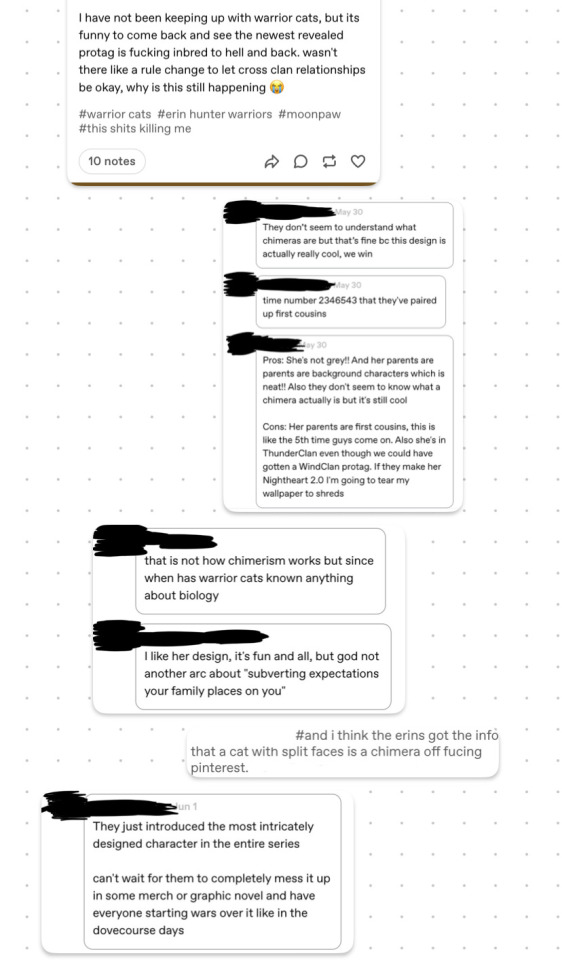
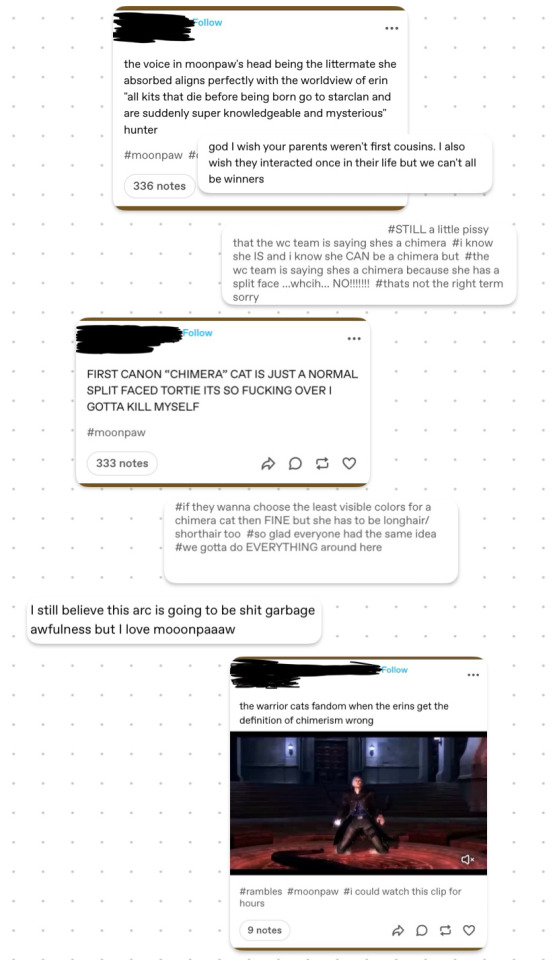
LIKE. Y’ALL.
(I would also like to mention that while yes, the inbreeding is gross and warrants criticism, when you have such isolated populations interbreeding, it was always bound to happen, especially with such complex and forgettable lineages (of feral cats, no less (y’know, animals that form family trees like that naturally?)). Honestly? It’s been an issue for so long that I really think we should just stop pointlessly whining about it, accept it (as long as they aren’t too closely related/it isn’t immediate family incest), and move on.)
I get constructive criticism and civil discourse is healthy in a fandom, but there’s no need to be so blatantly and endlessly petty and spiteful, especially towards the people who try so hard to give you the thing you enjoy in a consistent and timely manner and live up to its legacy. I agree that there are definitely things they’ve messed up on or could do much better with and that they should prioritize quality over quantity more, but c’mon. Honestly, y’all will just find anything to bitch about. 😭 Besides, enough with the pessimism and belittlement! Fandoms are supposed to be fun, and trust me, you will have much more fun if you just let yourself be excited and see what happens. Even if it does feel somewhat like toxic positivity to say so, there's no joy in just being a critic all the time. :]
Anyway, sorry for the exasperated ramble, and thank you for coming to my TEDtalk. 🙏
#i don’t mean to be rude but seriously#there is no winning with y’all#warrior cats#wc#warriors#warriors fandom#wc fandom#erin hunter warriors#erin hunter#hot take#call out post#fandom#fandom discourse#fandom drama#fandom hate#fandom discussion#fandom hypocrisy#civil discourse#discourse#literary criticism#media criticism#fandom critique#fandom criticism#constructive criticism
82 notes
·
View notes
Text
I’m actually really interested in how the qsmp fandom treats its female characters at large versus how the female characters’ fans treat their character of choice. Because there’s a general consensus to Not Be A Dick To Women, because women are awesome (source: I am one.) But then you get to the individual fandoms for each character and you see that either you really aren’t allowed to criticize those characters at all, or all you do is criticize.
(And keep in mind I love both these characters I’m going to talk about and I literally try and watch every stream they’re part of if I have the time.)
For the first category, let’s look at the fandom surrounding qJaiden:
She’s a silly bird girl! She loves Cucurucho, but not the Federation. She’s actively friends with the creatures that have tortured and manipulated and kidnapped her own friends, but that’s fine because she has trauma. She’s a bit of a hypocrite when it comes to keeping and telling secrets sometimes, but that’s fine because she’s just silly!
This is the general qJaiden fandom perspective. If you call her a hypocrite, you have people calling you misogynist. If you say she’s a bit Weird for being besties with the bear that tricked her into thinking her son was alive and forced her on a death march just to laugh in her face and show her that she’s dead, you’re called a misogynist.
You criticize her at all, or you point out her flaws, you’re labeled a misogynist. Because Jaiden is silly! She’s never done anything wrong, actually, you either just hate women or you don’t watch her pov because you clearly don’t understand her character, which is Just A Silly Woman. There’s no nuance to her character past that, and acknowledging the fact that she’s morally gray can be Bad for ‘outsiders’, or even ‘insiders’ if you’re loud enough about it.
On the flip side, let’s look at qBaghera’s fandom:
qBaghera is useless. She needs to stay in her lane. She needs to tell others her personal lore. She needs to give up on running for president. She needs to be president. She needs to hang out with Forever and Bad more. She needs to be more of a revolutionary. She needs to take a step back and stay in her lane.
This is the general qBaghera fandom. Deal. It’s gotten to the point where ccBaghera has asked that people stop criticizing her character because she plays her character very close to her own personality. It’s nonstop people telling her how to play her own character, but they all claim to be ‘fans’. Her character doesn’t have any agency of her own to them, so she’s criticized, or, when she’s hanging out with The Boys she’s criticized for hanging out with The Boys, or she’s not hanging out with The Boys enough. That’s the kicker: she felt the need to stop hanging out with the other two members of Dramatrio because people were demanding she hang out with The Boys while ignoring her own personal lore.
These two examples are very different, but they both show the misogyny hidden beneath a thin layer of on-the-surface feminism. Not being allowed to criticize a female character is Not feminist at all, and criticizing a female character too much is definitely Not feminist.
And the thing is? Neither fandom seems to acknowledge the fact that they’re being Weird about their favorite female characters. Neither are allowing their favs to have any agency: Jaiden is always ‘Silly’ and doesn’t get to have any consequences or criticism, and Baghera can’t do anything without being criticized. But if you say anything about either character in a remotely negative or criticizing way, the individual fandoms will hound you for “being misogynistic” or “favoring male ccs/characters” because the qsmp fandom Is Not A Dick To Women. Because the fandom at large loves its female characters and ccs, the smaller, individual fandoms can get away with some weird shit in the name of “feminism” covering up misogyny within.
#discourse ig#I’ve been thinking about this for a couple of weeks actually#since baghera made her little announcement#it’s genuinely confusing to me yk?#both as a writer and a fan of literary analysis and as a woman
155 notes
·
View notes
Text
The symbolism of numbers in All For The Game
Although numbers generally play a large role in the progression of AFTG, such as the importance of dates or Neil's countdown to his kidnapping in Baltimore, there are a few standout instances, rich with symbolism, that tend to go unnoticed.
4: The number four is deemed unlucky in japan, so much so that it’s often skipped when creating hospital rooms due to the intense negative stigma, this is because the number quite literally translates to death; a fact that definitely wouldn’t go unnoticed by Riko. The idea that Neil was quite literally branded with death and his life only officially beginning as Neil Josten once the 4 was removed after Baltimore therefore signifying his freedom. This number being removed by the thing supposed to kill him no-less is a twisted form of irony, leaving scarring to forever remind him of this near-death experience and the final run-in with his father, A man being the literal personification of Death in Neil’s eyes.
13: thirteen is presented as Andrew lucky number, with Betsy being Andrew 13th therapist, finally leaving the Spear household at 13 as well as moving in with Aaron being his 13th and final household. Andrew and Neil’s jersey numbers add up to 13 also, suggesting the idea of the two are inherently parallels of one another, destined to meet. This plays on 13 inherently being an unlucky number, creating a contrast to defy expectations; as per the norm with Andrews character of whom revolves around defying boundaries and breaking stereotypes.
3: Andrew's jersey number, three, is deemed as lucky in Japanese culture along with 4, representing culture, time (past, present, future) and the three elements of the mind, body, and spirit being connected. This idea accurately represents both Andrew and Jean through the number; both of which seeming to be the most effected by lost time and have the most growth by the last books in this respect, with Andrew and Jean having more security in their futures and a willingness to discuss it, (a particular struggle to both as their futures were deemed uncertain, with Jean committing suicide in all drafts of the books but the final one, and Andrew refusing to discuss the future or 'live' for himself.) along with finally having a connection between their mind and body, both of whom have historically been known to have their bodies not belong to themselves, manipulated and forced to stay in such a situation for the benefit of others (jean in the nest, Andrew in the spears,) the escape of this toxic cycle, both the mental scars in Andrew case and physical ones in Jeans, represent the lucky nature of the number and their future.
#to be added on#all for the analysis#all for the game#aftg#the foxhole court#tfc#aftg analysis#literary analysis#discourse#context#neil josten#andrew minyard#andreil#essay#jean moreau#analysis
685 notes
·
View notes
Text
Okay so I wanna preface my response by saying that I’m an English major currently working on a thesis about modern depictions of Cosmic Horror as compared to Lovecraft’s works, which includes Junji Ito as one of the examples of the former. So while I’m not necessarily an expert on cosmic horror or its derivatives, I have spent a lot of time researching it.
And while you’re correct that not all of Junji Ito’s work necessarily falls under the genre of cosmic horror, a great deal of it does, and that’s by design.
Before I continue I would like to acknowledge that I will be referring to the genre as “cosmic horror” rather than “Lovecraftian”. There’s been a big push to do this in genre studies for a while now in no small part due to Lovecraft’s rampant xenophobia and racism, much of which was blatantly reflected in his works. And while it might seem like a cop-out or “separating the art from the artist”, it’s important to acknowledge the fact that cosmic horror as a genre exists in large part due to Lovecraft’s influence, and that there are plenty of notable examples of cosmic horror created by people of color to this day that aims to analyze, deconstruct, or reclaim this subgenre of horror from its bigoted roots.
That said, my biggest gripe with your argument is that you seem to be operating under a limited (or at least incomplete) understanding of what cosmic horror is. Cosmic horror isn't just the fear of the unknown, it's the fear of insignificance, the fear that you will be unmade by something inescapable and unfathomable.
By that definition a lot of Junji Ito's works actively address this fear. The horror of The Enigma of Amigari Fault involves the "call of the void" and the human urge towards self destruction, a compulsion the protagonists can't fight no matter how hard they try, and a terrible discovery so ancient nobody remembers that it ever existed until it reappears. Uzumaki follows a lot of storylines involving a lot of different fears, but the connecting element is the idea that this town is "infected" by the abstract concept of a spiral, a threat that is borderline incomprehensible and impossible to fight. And those are just a couple of his most well known works; Junji Ito has plenty of works in which the horrifying element has no known cause, no way to escape, and represents something much larger than any of the victims it takes (eg, The Hanging Balloons, Earthbound, and Smashed are some of my personal favorite examples).
I will grant that not all of Junji Ito's works operate off of cosmic horror. Quite a few, like the Human Chair, involve body horror instead. While body horror is not necessarily mutually exclusive to cosmic horror (as evidenced by the numerous cosmic horror works employing it as part of the narrative), it tends to be a more grounded form of horror. As you said, "you know what the horror is", and the horror is the fragility and mutability of the human form.
Additionally, a lot of Junji Ito's works play off of Japanese cultural fears. Themes like isolation, self destruction, ancestral responsibility, and the consequences of war all come up repeatedly in his works, and all are themes that are not necessarily inherently connected to cosmic horror.
I will also concede that "calling any freaky horror 'lovecraftian'" is an unfortunately common problem in casual discourse. This is in part because, in absence of academic study of genre definitions, people tend to use well known examples to inform their personal definitions, and a lot of people tend to connect Lovecraft to Cthulhu, abstract and "weird" monsters, and the vague idea of madness. Specifying "cosmic horror" might help in part to separate this association, but then we would probably have a lot of casual definitions connecting it to aliens. But that's probably a not entirely avoidable problem.
That said, a lot of Junji Ito's work is genuinely "lovecraftian", if for no other reason than the fact that Junji Ito himself is quoted as having H. P. Lovecraft as a large influence for his work. We can discuss the ramifications of his work being at least partially inspired by the work of a man who was considered horrifically racist even in his own time, but that does not mean that influence isn't there.
Anyway, mostly I wrote this response because this is a subject I am actively invested in and I feel like saying that using cosmic horror or even "lovecraftian" to describe Junji Ito's work is wrong both misunderstands cosmic horror as a literary genre and glosses over the complexity of his work. Junji Ito is a master of rendering horror in both tangibly disturbing and psychologically horrifying forms at once, grappling with both the daily fears and anxieties of human life as well as the philosophical anxieties of our own existence within the same set of beautifully (and disgustingly) drawn circumstances. I feel as though claiming Junji Ito's work isn't cosmic horror does the same disservice as claiming that's all it is.
I wanna leave off by saying I hope this response doesn't come across as combative or pretentious. I'm autistic and horror and genre studies is my special interest, and Junji Ito is genuinely one of my all time favorite horror writers, so I felt like I had to chime in or else I was gonna combust lol. I'm more than happy to continue this discussion or provide cited sources if you're interested. I have a lot of books on cosmic horror (and "weird fiction" which is a whole different discussion entirely, and in fact what Junji Ito's work would probably be most accurately described as), and I'd be more than happy to quote passages from them :D
just saw someone call junji ito lovecraftian (loads shotgun)
#plucky squawks#genre studies#academic literature#cosmic horror#lovecraftian horror#junji ito#literary discourse#long post
28K notes
·
View notes
Text
...I must confront Apollo with his wrongs. To force a girl Against her will and and afterward betray! To leave a child to die which has been born In secret! No! Do not act thus. But since You have the power, seek the virtuous path. All evil men are punished by the gods. How then can it be just for you to stand Accused of breaking laws you have yourselves Laid down for men? But if--here I suppose What could not be--you gave account on earth For wrongs which you have done to women, you, Apollo and Poseidon and Zeus who rules In heaven, payment of your penalties Would see your temples empty, since you are Unjust to others in pursuing pleasure Without forethought. And justice now demands That we should not speak ill of men if they But imitate what the gods approve, but those Who teach men their examples.
Ion (from Ion by Euripides, translated by R. F. Willetts)
#okay i FINALLY read this play and i liked it a lot. there is so much going on here#but right after i read it i found some discourse that i sometimes stumble across in conversations about paganism#about how you can't treat gods like characters who do good or bad things#and that's sort of true? it doesn't really make sense to look at gods in (for example) greek mythology and treat them as wholly good or bad#and i think this applies whether you engage with them as literary characters or as gods (or both). adaptations that do this annoy me!#BUT. you cannot act like ancient societies didn't have moral questions and discussions about their own gods. they absolutely did#ion#apollo#euripides#queue
79 notes
·
View notes
Text
fun(?) fact: the first time (like 3-4 years ago) I really got cannibalism was when I read a short fanfiction about a man cannibalizing his stillborn son... I understood then... the potential...
(previous to this, I also shadowed a fandom with a subsection of people that thought cannibalism was really boring, so weirdly, I think I went on the opposite journey that most people have with the topic... I was afraid I was going to get called shallow and boring for when I first was like hey! cannibalism is kinda fun to explore!)
#literary queueicism#to be fair the other fandom people. i understand how the discourse spiraled to the point that they were saying that bc of specifically#what was happening with specific instances in those fandom spaces... like i get it but it did bias me against cannibalsim as eh for a bit#i think that cannicablism fic shows in how i characterize max btw#it was like highlighting how he wanted show love and affection (give a kiss) but found it becoming a bite and it spiraled and it was#like. he doesn't want to be a monster but he doesn't know how not to be or something... highlighting he can't form healthy relationships?#re: what i said in the beginning... i don't think max cares about being a monster or not but it's the inability to connect to family#abyssal stuff#abyssal lore#cannibalism
11 notes
·
View notes